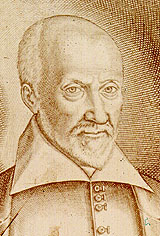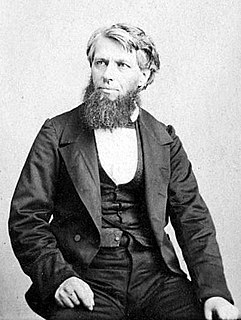A Quote by William Batchelder Greene
Man, having an ideal before him of that which he ought to be, and is not, and acting as though he possessed the character he ought to have, but has not, comes, by the very virtue of his aspiration, to possess the character he imagines.
Related Quotes
Some men -- not all men -- see always before them an ideal, a mental picture if you will, of what they ought to be, and are not. Whoso seeks to follow this ideal revealed to the mental vision, whoso seeks to attain to conformity with it, will find it enlarge itself, and remove from him. He that follows it will improve his own moral character, but the ideal will remain always above him and before him, prompting him to new exertions.
Therefore the good man ought to be a lover of self, since he will then both benefit himself by acting nobly and aid his fellows; but the bad man ought not to be a lover of self, since he will follow his base passions, and so injure both himself and his neighbors. With the bad man therefore, what he does is not in accord with what he ought to do, but the good man does what he ought, since intelligence always chooses for itself that which is best, and the good man obeys his intelligence.
Once in his life, a man ought to concentrate his mind upon the remembered earth, I believe. He ought to give himself up to a particular landscape in his experience, to look at it from as many angles as he can, to wonder about it, to dwell upon it. He ought to imagine that he touches it with his hands at every season and listens to the sounds that are made upon it. He ought to imagine the creatures there and all the faintest motions of the wind. He ought to recollect the glare of noon and all the colors of the dawn and dusk.
Living in the now is freedom from all problems connected with time. You ought to remember that sentence, you ought to memorize it, and ought to take it out, you ought to practice it, you ought to apply it. And most of all, you ought to rejoice in it because you have just heard how not to be wretched, miserable you any more but to be a brand new, and forever brand new man or woman.
That this gentleman [President John Adams] ought not to be the object of the federal wish, is, with me, reduced to demonstration. His administration has already very materially disgraced and sunk the government. There are defects in his character which must inevitably continue to do this more and more. And if he is supported by the federal party, his party must in the issue fall with him.
He that boasts of his ancestors confesses that he has no virtue of his own. No person ever lived for our honor; nor ought that to be reputed ours, which was long before we had a being; for what advantage can it be to a blind man to know that his parents had good eyes? Does he see one whit the better?
In every case, we ought to act that part towards another, which we would judge to be right in him to act toward us, if we were in his circumstances and he in ours; or more generally - What we approve in others, that we ought to practise in like circumstances, what we condemn in others we ought not to do.
Interdependence is and ought to be as much the ideal of man as self-sufficiency. Man is a social being. Without interrelation with society he cannot realize his oneness with the universe or suppress his egotism. His social interdependence enables him to test his faith and to prove himself on the touchstone of reality.
When a doctor arrives to attend some patient of the working class, he ought not to feel his pulse the moment he enters, as is nearly always done without regard to the circumstances of the man who lies sick; he should not remain standing while he considers what he ought to do, as though the fate of a human being were a mere trifle; rather let him condescend to sit down for awhile.
































